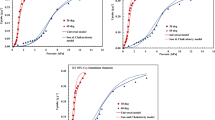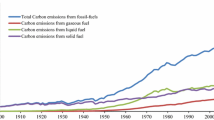Abstract
This report reviews the performance of metal–organic frameworks (MOFs) in Adsorption Heat Transformation (AHT) systems. MOFs are porous materials characterized with high surface areas and tunable properties that make them suitable for a range of applications. This study concentrates on the use of MIL-101(Cr) in a 10-kW cooling capacity system and compares its performance with activated carbon. Results show that less mass of MIL-101(Cr) is required to produce 10 kW of power compared to activated carbon, while also having a higher coefficient of performance. The COP of MIL-101(Cr) is calculated to be about 1.5 times higher than that of activated carbon, highlighting the potential of MOFs in refrigeration applications. However, MOFs are still in the preliminary stages of development and require more research to overcome challenges and prove their commercial viability.
Access this chapter
Tax calculation will be finalised at checkout
Purchases are for personal use only
Similar content being viewed by others
Abbreviations
- COP:
-
Coefficient of performance
- Cp:
-
Specific heat at constant pressure (kJ/kg-K)
- h:
-
Specific enthalpy (kJ/Kg)
- \({\dot{m} }\):
-
Mass flow rate (kg/s)
- P:
-
Pressure (kPa)
- \(\dot{Q}\):
-
Heat transfer rate (kW)
- qsh:
-
Heat of sorption (kJ/kg)
- R:
-
Universal gas constant (J/kg-K)
- tcycle:
-
Cycle time (hr)
- T:
-
Temperature (K)
- TA:
-
Adsorption Temperature (K)
- TC:
-
Desorption Temperature (K)
- X:
-
Mass fraction of ammonia (%)
- X:
-
Ammonia concentration (kg NH3/kg carbon)
- ads:
-
Adsorber
- con or H:
-
Condenser
- des:
-
Desorber
- eva or L:
-
Evaporator
- in:
-
Inlet
- max:
-
Maximum
- MOF:
-
Metal Organic Framework
- min:
-
Minimum
- out:
-
Outlet
- ref:
-
Refrigerant
- sat:
-
Saturation
- sol:
-
Solution
References
Heating and cooling, MIT Climate Portal. [Online]. Available: https://climate.mit.edu/explainers/heating-and-cooling. Accessed: 13 Mar 2023
K. Wang, E.A. Vineyard, Adsorption refrigeration system. ASHRAE J. 01 Jan 2011. [Online]. Available: https://www.osti.gov/biblio/1024270#:~:text=Adsorption%20refrigeration%20is%20an%20environmentally,high%20temperature%20and%20salt%20crystallization. Accessed: 08 Mar 2023
C.Y. Yan, 6.2 Refrigerator and Heat Pump, Introduction to Engineering Thermodynamics. [Online]. Available: https://pressbooks.bccampus.ca/thermo1/chapter/6-2-refrigerator-and-heat-pump/. Accessed: 08 Mar 2023
R. Gopal, What is Absorption?—Definition from Corrosionpedia, Corrosionpedia. [Online]. Available: https://www.corrosionpedia.com/definition/26/absorption. Accessed: 08 Mar 2023
Adsorption, Adsorption An Overview| ScienceDirect Topics. [Online]. Available: https://www.sciencedirect.com/topics/earth-and-planetary-sciences/adsorption. Accessed: 08 Mar 2023
X.-J. Kong, J.-R. Li, An overview of metal–organic frameworks for green chemical engineering. Engineering 7(8), 1115–1139 (2021)
E. Hastürk, S.-J. Ernst, C. Janiak, Recent advances in adsorption heat transformation focusing on the development of adsorbent materials. Curr. Opin. Chem. Eng. 24, 26–36 (2019)
S. Wang, X. **a, S. Li, Cooling performance of metal organic framework-water pairs in cascaded adsorption chillers. Appl. Therm. Eng. 189, 116707 (2021)
M. Berger, What is a MOF (metal organic framework)? Nanotechnology 02 Jul 2021. [Online]. Available: https://www.nanowerk.com/mof-metal-organic-framework.php. Accessed: 08 Mar 2023
A. Rocchetti, M. Lippi, L. Socci, P. Gullo, V. Khorshidi, L. Talluri, Metal-organic framework adsorbent materials in HVAC systems: general survey and theoretical assessment. Energies 15(23), 8908 (2022)
S. Vasta, V. Brancato, D. La Rosa, V. Palomba, G. Restuccia, A. Sapienza, A. Frazzica, Adsorption heat storage: state-of-the-art and future perspectives. Nanomaterials 8(7), 522 (2018)
A. Rezk, R. Al-Dadah, S. Mahmoud, A. Elsayed, Characterisation of metal organic frameworks for adsorption cooling. Int. J. Heat Mass Transf. 55(25–26), 7366–7374 (2012)
N. Riaz, M. Sultan, S. Noor, U. Sajjad, M. Farooq, M.U. Khan, S. Hanif, F. Riaz, Recent developments in adsorption heat pumps for heating applications. Adv. Mech. Eng. 14(4), 168781322210894 (2022)
M. Moayed Mohseni, M. Jouyandeh, S. Mohammad Sajadi, A. Hejna, S. Habibzadeh, A. Mohaddespour, N. Rabiee, H. Daneshgar, O. Akhavan, M. Asadnia, M. Rabiee, S. Ramakrishna, R. Luque, M. Reza Saeb, Metal- organic frameworks (MOF) based heat transfer: a comprehensive review. Chem. Eng. J. 449, 137700 (2022)
P. Henshaw, J. Aman, D.S. Ting, Solar sorption cooling for residential air-conditioning applications. Int. J. Renew. Energy Technol. 9(1/2), 136 (2018)
G. An, X. **a, S. Wu, Z. Liu, L. Wang, S. Li, Metal–organic frameworks for ammonia-based thermal energy storage. Small 17(44), 2102689 (2021)
Metal organic frameworks, Orange (Central West Publishing, Australia, NSW, 2019)
X. Yang, A. Arami-Niya, J. Lyu, X. Guo, Net, excess, and absolute adsorption of N2, CH4, and CO2 on metal–organic frameworks of zif-8, MIL-101(CR), and uio-66 at 282–361 K and up to 12 MPA. J. Chem. Eng. Data 66(1), 404–414 (2020). https://doi.org/10.1021/acs.jced.0c00738
MOFs vs. Other Porous Materials for Carbon Capture, novoMOF (2022). Available at: https://blog.novomof.com/mofs-vs.-other-porous-materials-for-carbon-capture Accessed: 28 April 2023
Author information
Authors and Affiliations
Corresponding author
Editor information
Editors and Affiliations
Rights and permissions
Copyright information
© 2023 The Author(s), under exclusive license to Springer Nature Switzerland AG
About this paper
Cite this paper
Al-rabadi, J., Aman, J. (2023). Metal Organic Frameworks (MOFs) in Adsorption Heat Transformations. In: Ting, D.SK., Vasel-Be-Hagh, A. (eds) Engineering to Adapt. TELAC 2023. Springer Proceedings in Energy. Springer, Cham. https://doi.org/10.1007/978-3-031-47237-4_8
Download citation
DOI: https://doi.org/10.1007/978-3-031-47237-4_8
Published:
Publisher Name: Springer, Cham
Print ISBN: 978-3-031-47236-7
Online ISBN: 978-3-031-47237-4
eBook Packages: Economics and FinanceEconomics and Finance (R0)




